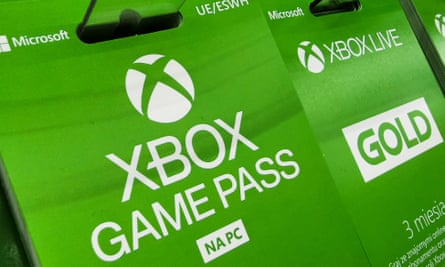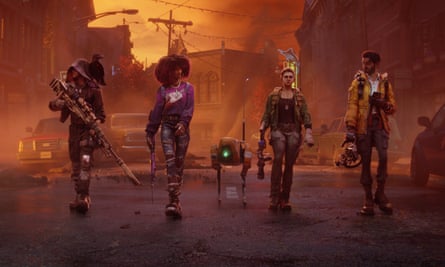Microsoft has been in the video game business for over 20 years, but its Xbox console has been the perpetual runner-up. 2020’s Xbox Series S/X console is being significantly outsold by Sony’s PlayStation 5 – in keeping with its predecessor, 2013’s Xbox One, which was outsold more than 2:1 by the PlayStation 4. It’s currently suffering from a lack of big-ticket exclusive games, and its most recent, Redfall, was a critical disappointment. What’s more, its huge $70bn merger with Activision Blizzard, a deal that would go a long way towards solving its content problem by buying it Call of Duty and much more, is currently being held up by UK regulators.
Looking rather downtrodden on a recent episode of gaming show Xcast, Xbox boss Phil Spencer said that he was “not in the business of out-consoling Sony or out-consoling Nintendo”, intimating that the long-running console war between Xbox, Nintendo and PlayStation was a losing battle for Microsoft. Instead of touting Xbox sales figures, for the past few years the company has presented its subscription service Game Pass as its metric for success: how many games it has, how many subscribers, how many hours they have played. It is betting on a post-console future, on being able to play games on any screen with the help of cloud servers – a streaming and subscription-centric future that has already transformed music, film and TV.
Whether you are running a console business or a subscription business, however, great games need to be at the heart of it if it is going to be successful. Microsoft has been on an acquisition spree in recent years, buying up hitmakers such as Bethesda (The Elder Scrolls, Fallout) and critical darlings such as Double Fine (Psychonauts 2), and of course initiating its merger with Activision Blizzard. But it is also looking farther afield than these huge, western studios for games that it hopes will make Game Pass essential, says Xbox’s developer relations chief, Sarah Bond.
“The games industry is very western European and east Asian focused,” she says. “We have focused on trying to get more global with it, because there’s more happening in places like India and Africa. We want to make sure we’re on the ground as we start to see more development there, as traditionally there hasn’t been much.
“The full [diversity] of the world is not represented by the creators in gaming today. And therefore the stories don’t fully represent the cultures and the peoples in gaming today. 70% of people under 25 would rather play a game than do anything else – so what are they playing? We have something that can really shape how someone feels about the world … let’s make sure that we use this powerful thing to help people understand more what unites us, rather than what divides us.”

Xbox currently has partnerships with developers in eastern Europe and India, and is on the hunt for more, says Bond. “What’s important is getting creators from geographies that are underserved … Console gaming is really concentrated in a set of markets: 200 million people play on a console today, but 3 billion people play games. As soon as someone gets access to high-speed connectivity, they play games. So what appeals to the next 1 billion gamers that are gonna come online?” She describes global diversity among game developers and studios as “both an opportunity and an imperative” – the opportunity being, she says, not just to monetise players, but to connect them.
“Gaming really is the only form of media where you can connect with someone and you don’t know what they look like, you haven’t met them, they might speak a totally different language,” she says. “[It] gives you the ability to participate in a unique perspective – not just watch it, but participate in it.”
Microsoft’s Game Pass offers smaller developers a different way to get their games in front of people. Release a game on to traditional digital storefronts – such as Steam on PC, or the PlayStation Store – and you are competing with tens or hundreds of others at any one time. On Game Pass, you are immediately in front of 25 million subscribers, in a curated library of games. As for remuneration, Microsoft claims to have paid out “hundreds of millions” to developers in Game Pass license fees, though the details of those payouts remain opaque. For the past nine years, Xbox has also offered a way for developers to essentially self-publish on its consoles through its ID@Xbox program.
after newsletter promotion

Bond believes that alongside Microsoft’s big-ticket game studio acquisitions, this kind of support for smaller developers is essential to building Xbox’s library. “I believe that consistent and unwavering support for smaller developers is core to the health of our industry, and it’s core to ensuring that new creative things can thrive and have an audience,” she says. “I look at the indie space and every year, some game that nobody would ever have been able to dictate comes out … look at Stray, or Vampire Survivors. Would you have told someone to make that?”
Game Pass also lets bigger developers take a punt on creative passion projects, says Bond – such as Obsidian’s reformation-era mystery game Pentiment, which was very well received last year. “Relative to music and video, a game’s business model has a really deep impact on the gameplay itself,” she says. “Particularly for developers who want to make a game that isn’t free-to-play – which changes the gameplay design – and want to try something that’s a little bit of a leap, a stretch, new or quirky, they like that Game Pass drives discovery for them and they can take the risk.”
Xbox spokespeople have been arguing for a while that a diversity of business models, from premium £70 games to subscription models to free-to-play, is beneficial for the creative health of games – and if it can’t beat Sony and Nintendo at selling consoles and games, it hopes to beat them in the new arena of cloud and subscription-based gaming. Both its gigantic acquisition of Activision Blizzard and its smaller-scale efforts to attract smaller developers from emerging gaming regions are part of a fundamental change in tactics for Xbox: it sees players, not devices, as the future of games.

